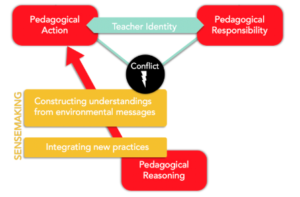Emotionality in Coaching Conversations
The Goal
Teachers that have participated in VFF cycles have reported feeling vulnerable and emotional during the debriefs. This analysis offers a case study of one teacher participant, Lizette, who became visibly upset during her third VFF debrief, yet managed to incorporate feedback productively into her own learning. This case offers us an opportunity to explore the ways the VFF cycle can support teachers’ sensemaking and contribute to their development of pedagogical judgment.
Research Questions
- How do teachers’ negative emotions shape their sensemaking in coaching conversations?
- What is the role of Lizette’s emotion during her sensemaking?
How Are We Addressing Our Research Questions?
We are basing our analysis in theories of pedagogical judgment, teacher sensemaking, and identity:

By analyzing transcript and video of Lizette’s VFF debrief, we have found that when supported, negative emotions can motivate teachers to reconstruct their teacher identities and adopt new practices. In Lizette’s case, we find that
- The conflict between Lizette’s pedagogical actions and responsibility spurred sensemaking that led to identity reconstruction
- The rushed VFF debrief prevented Lizette from fully engaging in sensemaking and pedagogical reasoning, resulting in her tears
- LIzette’s negative feelings motivated her to reconstruct her teaching identity by integrating a new practice, aligning her pedagogical actions with her pedagogical responsibility
So What?
Acknowledging, analyzing, and understanding the role of teachers’ emotions is a step toward challenging pastoral power by normalizing emotionality in teachers’ workplaces. Additionally, connecting teachers’ emotions and their ongoing development of pedagogical judgment explicitly offers a framework of emotionality in sensemaking that may help coaches support teachers’ continued professional learning. This analysis contributes to efforts to move beyond cognitive accounts of teacher learning toward theories that include social, emotional, and contextual dimensions in efforts to humanize professional development.